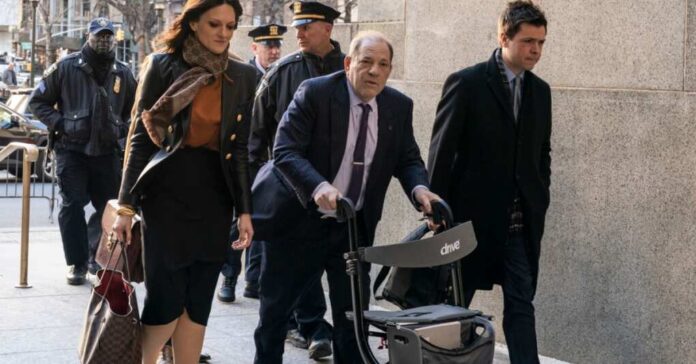
In January of 2020, a disgusted nation tuned in to watch the Manhattan trial of media mogul Harvey Weinstein. The disgraced Miramax co-founder stood accused of sexual assault, a charge for which he was found guilty and jailed. He quietly faded from the public eye and back into obscurity.
Last week, however, Weinstein shot back into the spotlight after the New York Court of Appeals overturned his conviction, citing improper rulings by the trial judge during the infamous #MeToo trial. Specifically, the judge allowed women to testify about allegations unrelated to the case, causing a pre-determined prejudice against Weinstein. The court determined that admitting such testimony served no legitimate purpose and portrayed Weinstein unfairly. Consequently, Weinstein’s 23-year sentence was nullified, paving the way for a potential new trial.
Now, Manhattan District Attorney faces another challenge in his hush-money case against former President Donald Trump. Weinstein’s overturned conviction could have implications on what evidence is allowed to be presented and derail the common anti-Trump prosecutorial strategy of bringing up other Trump allegations in an attempt to remind judges and juries that Trump has been prosecuted before and, therefore, must be guilty.
The appeals court’s ruling focused on two main decisions made by the trial judge in Harvey Weinstein’s case that were deemed problematic: first, the judge’s “Molineaux” ruling that allowed testimony from three additional accusers, and second, the “Sandoval” ruling permitting prosecutors to question Weinstein about various unrelated past misconducts.
While it’s not unusual for prior “bad act” witnesses, like the three who testified in the Weinstein trial, to be called to the stand, the appeals court determined they were used to suggest guilt, which is unacceptable.
Because of this, Bragg may find himself unable to call on Karen McDougal, a former Playboy model who also alleged to have had an affair with Trump. She also was allegedly paid hush money to keep her silence, but her case is not part of Trump’s current charges. In March, Judge Juan Merchan’s Molineaux decision ruled that her testimony would be limited only to her hush money payment. Bragg is prohibited from introducing the more salacious details of her encounter with Trump.
However, perhaps the most critical thing in the Trump trial was the overturning of the Weinstein judge’s Sandoval ruling, which allowed prosecutors to question the disgraced media mogul about unrelated misconduct if he had chosen to testify on his own behalf. Because of this, although Weinstein wanted to testify, he opted not to do so.
It’s the same dilemma Trump faces in his hush money trial.
The Sandoval ruling is specific to New York’s court system. It allows judges to independently decide if prior misconduct can be used to “prove” guilt by allowing prosecutors to ask questions regarding past unrelated charges or actions. It severely limits what prosecutors can ask a defendant on the stand or, in Trump’s case, allows any line of questioning no matter how unfair, unrelated, or damaging it may be.
Naturally, since the decision was left up to Merchan, the anti-Trump judge laid out exactly what prosecutors can ask Trump on the stand, and his outline gives Braggs nearly unlimited authority to question the former president about past conduct and trials. This includes his civil court case that found him and others guilty of “financial fraud,” his breaches of a gag order related to the same case, and his defeat in the civil defamation lawsuit filed by E. Jean Carroll.
Merchan’s overly eager decision to allow Bragg to press Trump about unrelated charges and past behaviors may unfairly influence a jury. Still, it will most likely lead to Trump’s unwillingness to take the stand.
And that’s a good thing. It gives Trump’s legal team the perfect opportunity to appeal the case if he loses. It opened an avenue where Trump could argue that he wanted to take the stand, but Merchan’s Sandoval ruling impeded his constitutional right to defend himself.
For Bragg, the case is unraveling in a million small ways almost daily. But it’s entirely possible that the overturning of Weinstein’s conviction could allow Trump’s defense team to look at prior convictions for abuses of Sandoval rulings made by tainted and biased judges, as well as judges’ Molineaux rulings that allowed prosecutors to bring in a witness to discuss unrelated past cases and charges, like January 6, to paint Trump in the most unflattering light possible and help secure a conviction.
Weinstein may be the most unlikely hero America has ever seen.














